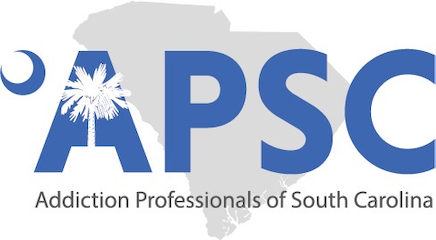APSC Glossary of Terms
The Addiction Professionals of South Carolina is comprised of alcoholism and drug abuse counselors
who, as responsible health care professionals, believe in the dignity and worth of human beings. In the practice
of their profession they assert that the ethical principles of autonomy, beneficence and justice must guide their
professional conduct. As professionals dedicated to the treatment of alcohol and drug dependent clients and
their families, they believe that they can effectively treat its individual and familial manifestations. APSC members
dedicate themselves to promote the best interests of their society, their clients, their profession and their
colleagues.
One who demonstrates professional competence necessary to perform tasks directly related to the Domains while providing treatment to clients and significant others in a variety of treatment settings.
Alcohol and Drug Counselor
Advanced Alcohol and Drug Counselor
Clinical Supervisor
A written case record where applicant as primary counselor has provided the full range of care from
intake through termination/continuing care. Client name and other identifying information must not be evident on
the case record.
A person receiving any type of alcohol and drug services from counselor’s place of employment.
A person(s) receiving any type of alcohol and drug services from your place of employment. Additionally, for
persons receiving clinical services, the client may include family members or significant others.
Activities related to assessment, counseling and rehabilitative services.
Clinical Supervision Documentation Form is supplied. Number of hours and/or minutes
should be carefully documented on this form and notation identifying supervision session as individual or group
supervision. Documentation of clinical supervision, not administrative supervision, is required. Treatment team or
clinical staffing are not clinical supervision.
As a state affiliate of NAADAC: the Association of Addiction Professionals, the APSC adheres to
the Code of Ethics set by NAADAC.
An APSC Certified Clinical Supervisor or CS completes this form noting strengths and
needs for specific domain. Form can be found here.
The International Credentialing & Reciprocity Consortium.
Activities related to prevention, education, community organization, training and professional development.
Counselor’s definition of substance use disorders and how they should be treated to
include theory or technique(s) applied in the practice of treatment.
A person who has been certified by APSC, NAADAC or IC&RC.
The provision of training which will enhance or improve the level of skills and competence of the participants.The provision of training which will enhance or improve the level of skills and competence of the participants.
Peer Review Glossary of Terms
The Addiction Professionals of South Carolina is comprised of alcoholism and drug abuse counselors
who, as responsible health care professionals, believe in the dignity and worth of human beings. In the practice
of their profession they assert that the ethical principles of autonomy, beneficence and justice must guide their
professional conduct. As professionals dedicated to the treatment of alcohol and drug dependent clients and
their families, they believe that they can effectively treat its individual and familial manifestations. APSC members
dedicate themselves to promote the best interests of their society, their clients, their profession and their
colleagues.
The International Credentialing & Reciprocity Consortium
A person who has been certified by APSC (CPSS/RC) to practice Peer Recovery Services in the PRS Domains.
The provision of training which will enhance or improve the level of skills and competence of the participants.
A person(s) seeking, or in recovery, participating in Recovery Services. Additionally, the participant may include family members or significant others.
One who demonstrates professional competence necessary to perform tasks directly related to the Peer Recovery Domains while providing recovery services to people seeking or in recovery and significant others in a variety of treatment and recovery.
Peer Recovery Service Domains include: 1) Advocacy, 2) Education/Mentoring, 3) Recovery Support, 4) Ethical Responsibility.
Enhancing successful stabilization, recovery, and actualization through person-centered, community integrated, solution-focused, and alliance-based services.Enhancing successful stabilization, recovery, and actualization through person-centered, community integrated, solution-focused, and alliance-based services.
Qualified individual who teaches, guides, supports, and observes the Peer Recovery Service Provider in a job, academic, or volunteer setting.

